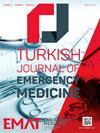成人急性高钾血症。
IF 2.3
Q3 EMERGENCY MEDICINE
引用次数: 0
摘要
高钾血症是急诊科慢性肾病患者常见的危及生命的医疗状况。由于高钾血症不表现出任何特定的症状,因此临床诊断困难。高钾血症引起广泛和戏剧性的医学表现,包括心律失常和猝死。高钾血症一般在实验室通过血清测定来确定。治疗包括注意稳定心膜,将钾从细胞外转移到细胞内,增加钾的排泄。本文讨论高钾血症的管理在ED在目前的证据的光。本文章由计算机程序翻译,如有差异,请以英文原文为准。
Acute hyperkalemia in adults.
Hyperkalemia is a common, life-threatening medical situation in chronic renal disease patients in the emergency department (ED). Since hyperkalemia does not present with any specific symptom, it is difficult to diagnose clinically. Hyperkalemia causes broad and dramatic medical presentations including cardiac arrhythmia and sudden death. Hyperkalemia is generally determined through serum measurement in the laboratory. Treatment includes precautions to stabilize cardiac membranes, shift potassium from the extracellular to the intracellular, and increase potassium excretion. The present article discusses the management of hyperkalemia in the ED in the light of current evidence.
求助全文
通过发布文献求助,成功后即可免费获取论文全文。
去求助
来源期刊

Turkish Journal of Emergency Medicine
EMERGENCY MEDICINE-
CiteScore
1.70
自引率
0.00%
发文量
30
审稿时长
22 weeks
期刊介绍:
The Turkish Journal of Emergency Medicine (Turk J Emerg Med) is an International, peer-reviewed, open-access journal that publishes clinical and experimental trials, case reports, invited reviews, case images, letters to the Editor, and interesting research conducted in all fields of Emergency Medicine. The Journal is the official scientific publication of the Emergency Medicine Association of Turkey (EMAT) and is printed four times a year, in January, April, July and October. The language of the journal is English. The Journal is based on independent and unbiased double-blinded peer-reviewed principles. Only unpublished papers that are not under review for publication elsewhere can be submitted. The authors are responsible for the scientific content of the material to be published. The Turkish Journal of Emergency Medicine reserves the right to request any research materials on which the paper is based. The Editorial Board of the Turkish Journal of Emergency Medicine and the Publisher adheres to the principles of the International Council of Medical Journal Editors, the World Association of Medical Editors, the Council of Science Editors, the Committee on Publication Ethics, the US National Library of Medicine, the US Office of Research Integrity, the European Association of Science Editors, and the International Society of Managing and Technical Editors.
 求助内容:
求助内容: 应助结果提醒方式:
应助结果提醒方式:


